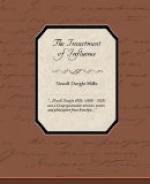Sacrifice is also the secret of influence. Long ago Cicero noted that tales of heroes and eloquence and self-sacrifice cast a charm and spell upon the people. When men sacrifice ease, wealth, rank, life itself, the delight of the beholders knows no bounds. If we call the roll of the sons of greatness and influence we shall see that they are also the sons of self-sacrifice. The Grecian hero who lost his life that he might save his influence is typical of all the great leaders. Phocion was a patriot and martyr whose single error in judgment brought down a catastrophe upon his beloved Athens. When the fierce mob surrounded his house and prepared to beat down his doors, friends offered Phocion escape and shelter, but the hero went calmly forth to meet his death. When the day of execution arrived the cup of poison was handed to the other leaders first. The jailer was careful to see to it that before he reached Phocion he had only a few drops of hemlock left in his cup, but the hero drew out his purse and bade a youth run swiftly to buy more poison, saying to the onlookers: “Athens makes her patriots pay, even for dying.” Losing his life, Phocion, found immortal influence.
The history of Holland’s greatness is the history of one who saved liberty by losing his own life. William the Silent was a prince in station and in wealth, yet for Holland’s sake made himself a beggar and an outlaw. He feared God, indeed, but not the batteries of Alva and Philip. His career reads like one who with naked fists captured a blazing cannon. Falling at last by the dagger of a hired assassin, he exclaimed: “I commit my poor people to God and myself to God’s great captain, Christ.” When he died little children cried in the streets. He lost his life, said his biographer, but saved his fame. And what shall we more say of Italy’s hero, who wore his




